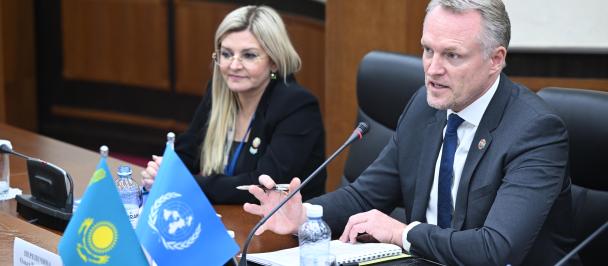Eswatini Takes Stock of Progress Towards Agenda 2063
August 21, 2022
UNDP Eswatini Economic Advisor, Mr. Souleman Boukar, addresses stakeholders during the launch of the Agenda 2063 evaluation process.
Eswatini is in the process of evaluating the African Union Agenda 2063 First Ten Year Implementation Plan (2014-2023) and developing the Second Ten Year Implementation Plan (2024-2033). This process is known as the African Union Development Agency-New Partnership for Africa’s Development (AUDA-NEPAD) Special Project.
Adopted by Heads of State and Governments of the African Union in Addis Ababa on 31 January 2015, Agenda 2063 – The Africa We Want – seeks to deliver sustainable development which considers the needs of all citizens of the continent. To breathe life into the Agenda, countries adopted a 10-year Implementation Plan to accelerate progress to 2063.
As a result, the Ministry of Economic Planning and Development, through UNDP technical support, is leading the implementation of the AUDA-NEPAD Special Project. At an event held at the Hilton Garden Inn on 18 August 2022, attended by different stakeholders, Eswatini kickstarted the process for the government to reflect on the extent to which these commitments have been implemented.
According to the Ministry of Economic Planning and Development, key milestones reached by the country in pursuing some of the goals under Agenda 2063 include the following:
- Increase in the volume of intra-Africa trade from 8.3% (2013) to 18% (2020);
- Increase in access to electricity from 69% (2013) to 78% (2020);
- Increase in access to safe drinking water from 72% (2013) to 75.6% (2017);
- Decline in new HIV infections per 1000 population from 2.38% (2011) to 1.36% (2018);
- An increase in the proportion of seats held by women in national parliament from 18% (2013) to 22% (2018) among others.
Despite the achievements made, progress in some of the goals remains slow because of challenges faced during implementation which include impacts of climate change, the COVID- 19 pandemic, and unprecedented civil unrest.
Addressing stakeholders at the launch of the evaluation process, UNDP Resident Representative, Ms. Rose Ssebatindira, said this reflection is important because it allows the government to evaluate where financing for development is focused. She was represented by the UNDP Economic Advisor, Mr. Souleman Boukar.
“Such reflection presents an opportunity for the government to intentionally redirect the allocation of resources to areas of need,” she said.
She said Agenda 2063 is deeply connected to the United Nations’ Agenda 2030 and it is important for the government not to view these agendas in isolation but more on how they complement each other to create the world we all want to see. She urged the government in collaboration with development partners to Build Back Better through the Sustainable Development Goals and Agenda 2063 acceleration.
“We must accelerate the universal provision of essential services to all, and guarantee access to quality healthcare, education, and basic income security, as well as to water, sanitation, clean energy and the internet, especially for the most vulnerable populations,” said Ms. Ssebatindira. “All these development aspirations are well encapsulated in the AU-NEPAD Agenda 2063.”
Speaking at the same event, the Minister of Economic Planning and Development, Hon. Dr. Tambo Gina said Agenda 2063 was mainstreamed into the National Development Plan, which was developed through UNDP support, as well as in sector plans with an effort made to allocate funds to pursue some of the relevant activities. Hon. Gina was represented by his counterpart at the Ministry of Tourism and Environmental Affairs, Hon. Moses Vilakati.
“The integration of this agenda into national plans has made it possible to ensure that the Agenda 2063 aspirations, goals and targets continue to shape the country’s development and subsequently that of the continent. We need to go beyond implementing this Agenda but also to continuously monitor, evaluate and report on progress made to inform policy decisions going forward,” he said.
The special project processes will start with extensive consultation countrywide which will culminate in a national consultations report to be submitted to the AU Commission by 15 September 2022.

 Locations
Locations
